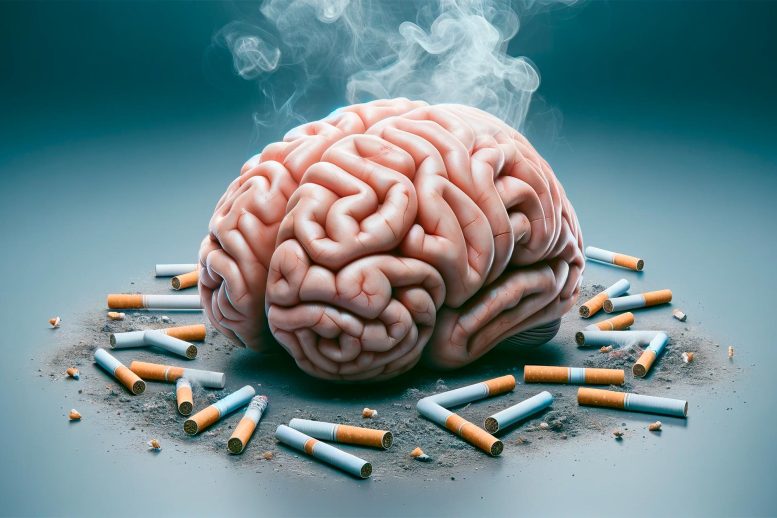
Research from Washington University shows that smoking shrinks the brain and speeds up brain aging, a process that is irreversible even after quitting. The study, analyzing data from the UK Biobank, highlights the crucial role of quitting smoking in preventing further brain damage and reducing dementia risk. Credit: SciTechDaily.com
Findings help explain how smoking is linked to Alzheimer’s, dementia.
Smoking shrinks the brain, according to a study by researchers at Washington University School of Medicine in St. Louis. The good news is that quitting smoking prevents further loss of brain tissue — but still, stopping smoking doesn’t restore the brain to its original size. Since people’s brains naturally lose volume with age, smoking effectively causes the brain to age prematurely, the researchers said.
The findings, published in Biological Psychiatry: Global Open Science, help explain why smokers are at high risk of age-related cognitive decline and Alzheimer’s disease.
The Neglected Effects of Smoking on the Brain
“Up until recently, scientists have overlooked the effects of smoking on the brain, in part because we were focused on all the terrible effects of smoking on the lungs and the heart,” said senior author Laura J. Bierut, MD, the Alumni Endowed Professor of Psychiatry. “But as we’ve started looking at the brain more closely, it’s become apparent that smoking is also really bad for your brain.”
Link Between Smoking, Brain Size, and Genetics
Scientists have long known that smoking and smaller brain volume are linked, but they’ve never been sure which is the instigator. And there is a third factor to consider: genetics. Both brain size and smoking behavior are heritable. About half of a person’s risk of smoking can be attributed to his or her genes.
To disentangle the relationship between genes, brains, and behavior, Bierut and first author Yoonhoo Chang, a graduate student, analyzed data drawn from the UK Biobank, a publicly available biomedical database that contains genetic, health and behavioral information on half a million people, mostly of European descent. A subset of over 40,000 UK Biobank participants underwent brain imaging, which can be used to determine brain volume. In total, the team analyzed de-identified data on brain volume, smoking history, and genetic risk for smoking for 32,094 people.
Interplay Between Genetics, Smoking, and Brain Volume
Each pair of factors proved to be linked: history of smoking and brain volume; genetic risk for smoking and history of smoking; and genetic risk for smoking and brain volume. Further, the association between smoking and brain volume depended on dose: The more packs a person smoked per day, the smaller his or her brain volume.
When all three factors were considered together, the association between genetic risk for smoking and brain volume disappeared, while the link between each of those and smoking behaviors remained. Using a statistical approach known as mediation analysis, the researchers determined the sequence of events: genetic predisposition leads to smoking, which leads to decreased brain volume.
Irreversible Consequences and Prevention
“It sounds bad, and it is bad,” Bierut said. “A reduction in brain volume is consistent with increased aging. This is important as our population gets older, because aging and smoking are both risk factors for dementia.”
And unfortunately, the shrinkage seems to be irreversible. By analyzing data on people who had quit smoking years before, the researchers found that their brains remained permanently smaller than those of people who had never smoked.
“You can’t undo the damage that has already been done, but you can avoid causing further damage,” Chang said. “Smoking is a modifiable risk factor. There’s one thing you can change to stop aging your brain and putting yourself at increased risk of dementia, and that’s to quit smoking.”
Reference: “Investigating the Relationship Between Smoking Behavior and Global Brain Volume” by Yoonhoo Chang, Vera Thornton, Ariya Chaloemtoem, Andrey P. Anokhin, Janine Bijsterbosch, Ryan Bogdan, Dana B. Hancock, Eric Otto Johnson and Laura J. Bierut, 6 October 2023, Biological Psychiatry Global Open Science.
DOI: 10.1016/j.bpsgos.2023.09.006









I mean I knew this. And I know smoking is bad for me. My health has nothing to do with why I continue to do it.
What is/are the ‘active ingredient/s’ that are responsible for the shrinkage? Is it just tobacco or does inhaling smoke from generic burning vegetable matter have similar results? Certainly smoke from wildfires or cooking is not good for people who inhale it! This research raises as many new questions as it answers.
Do now administrations start to promote smoking?
I’ll send this article to my smoking friends who will say, “So stopping won’t reverse the damage? Then I might as well keep smoking!”
You COULD have left a little room for hope…Don’t you think?
Depends on what you are smoking.
“Washington University School of Medicine in St. Louis…Biological Psychiatry: Global Open Science…senior author Laura J. Bierut, MD, the Alumni Endowed Professor of Psychiatry…UK Biobank…Yoonhoo Chang, Vera Thornton, Ariya Chaloemtoem, Andrey P. Anokhin, Janine Bijsterbosch, Ryan Bogdan, Dana B. Hancock, Eric Otto Johnson and Laura J. Bierut Biological Psychiatry Global Open Science…
Do any of these austere and august entities inspire anything but a deep mistrust in you, post-COVID?
FJB
Interesting Study.
How about Secondary Smoking ?
How about Smoke from burnt crops?
Can a similar study be done for consumption of ethyl alcohol and details disclosed with statistical Correlation between the quantity of such alcoholic beverages consumed and effect on brain tissue?
Can the evidence in this study be correlated with actual details of tobacco products consumed including Nasal use with snuff powder and other such habits used by various humans and its impact on neurochemicals and also the brain Cells themselves?🙏
There are other important organs which undergo damage as a result of various items we consume over a short, medium and long term which cause damage to the tissue Cells and lead to health issues which are dependent in time and quantity of consumption ? Gathering evidence of the correlation between solids, liquids and carbonated liquids we consume and the impact of the same on the Human Ecosystem could produce interesting results.
We will sooner or later have the ability to process Big Data once we get a practical Quantum Computing Supercomputers in place to draw meaningful conclusions related to good health and safety related to many such studies dependent of statistical analysis and Correlation of causes and effects.
The real problem is in the sub atomic Quantum Realm as everything is dependent on Probability, other than statistical analysis we don’t have any other way of determining cause and effect to find out which came first. The Chicken or the 🥚 Egg? I know that without the mother Hen which laid the Egg , the chicken would not have been hatched.
Si the ❓⁉️ trillion dollar question my friends is where did the Mother Hen come from.